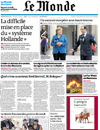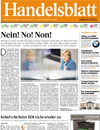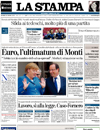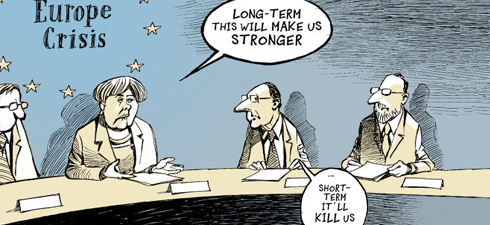Le Monde in its editorial shows a certain impatience with European summits that have been coming fast and furious since the eurozone has been gripped by the debt crisis – and they’re all starting to look the same, the paper writes: “The 17 are all clogged up. They are doing emergency plumbing when they ought to be taking a good look at all the piping.” The French daily hopes that the upcoming European Council will be focused on realism:

It may be time for the Council to reach a climax in the ongoing drama, to let Europeans grasp just how close they are to the abyss; because they are. And, for the first time, there’s a comprehensive plan on the table that looks like the start of a solution. It must be adopted in Brussels on Friday, and even go further ... In the search for a positive compromise, the responsibility weighs as heavily on France as on Germany. Both must take some risks to escape a lethal status quo.
Handelsblatt denounces the “fireworks of ideas” that it believes will harm the German economy. Satisfied with Angela Merkel’s “No” to eurobonds, Gabor Steingart, the editor-in-chief of the business daily, demands that the Chancellor explain the German model to her colleagues:

She ought to explain to our friends that nobody is going to be helped by Germany generously dividing up the fruits of its labour. Quite the opposite: to say "No" to the ideas of Barroso is to say "Yes" to Europe. Replacing “work” and “effort” by “consumption” and “credit” in the European economic system has got us into this current mess. A courageous "No" to these proposals means "Yes" to Europe. Europe, the truth is, needs a culture of rolled-up sleeves more than a philosophy of parasitism.
“If we fail to come up with a collective response, the probability that the euro will collapse is real,” warns Público, which sets out the possible consequences in detail:

A return to worthless national currencies, a rush on the banks, inflation, a return to capital and exchange-rate controls, shrinking markets, mass bankruptcies and failed states, and unemployment soaring to unimaginable levels. All the European leaders are aware that the disaster of the euro will be a tragedy [...] Merkel is right in saying that there can be no pooled debts without pooled controls of balance sheets and taxation; Hollande is right in saying that the urgency of the situation calls for a more massive intervention in the debt market using the stabilisation funds and by the ECB, and the creation of eurobonds. Both are right – but nobody seems willing to yield to the other’s arguments. That leaves the outlook looking bleak.
For La Stampa, “it was clear from the encounter in Rome between Monti, Merkel, Rajoy and Hollande” on June 22 that the Council meeting, which gets underway this Thursday, “will be a tough and tricky test that will see European leaders try to establish and, who knows, bring in a revamped monetary union”:

After euro 1, dangerously teetering over the abyss, comes euro 2. How would it work? When, and how far would it extend? Almost everyone, except the English, who are looking on the agony of the old continent from atop their sterling, agree on the need to overhaul the monetary union; not everyone agrees, however, on the timing and the dosage of the formula. [...] It will not be easy to agree on the concept of ‘political union’, which is interpreted differently by the countries attending the summit (...) In the decisive dilemma between integration and disintegration, there is no third choice.
“To save the euro we must first accept, and admit, that the single European currency, like anything else in this world, is mortal and can die tomorrow if no one takes care of it or worries themselves with it,” writes Luis Bassets in the El Pais daily:

To say that the euro is irreversible sounds like prayers for rain. The more it gets repeated, all the more real becomes the dark and undesirable image of a Europe without the euro and a world without Europe [...] We all grasp it perfectly: the euro is mortal, and it can die in our arms in the coming days. Mentally, we have already entered uncharted territory. [...] It’s no wonder therefore that over the last hours the paper mills in Europe have been churning out manifestos, articles and urgent reports searching for a formula that can twist on the tap for Eurobonds, for the saving graces of solidarity, for the transfer union ruled out so far by Germany – a tap that can at the same time guarantee the austerity, the control and the responsibility demanded by Angela Merkel [...] The problem is that very few of these ideas can be put into action right away, and their effectiveness is even less evident while it remains necessary to appease the markets placing bets on the mortality of the euro.
Was this article useful? If so we are delighted!
It is freely available because we believe that the right to free and independent information is essential for democracy. But this right is not guaranteed forever, and independence comes at a cost. We need your support in order to continue publishing independent, multilingual news for all Europeans.
Discover our subscription offers and their exclusive benefits and become a member of our community now!












